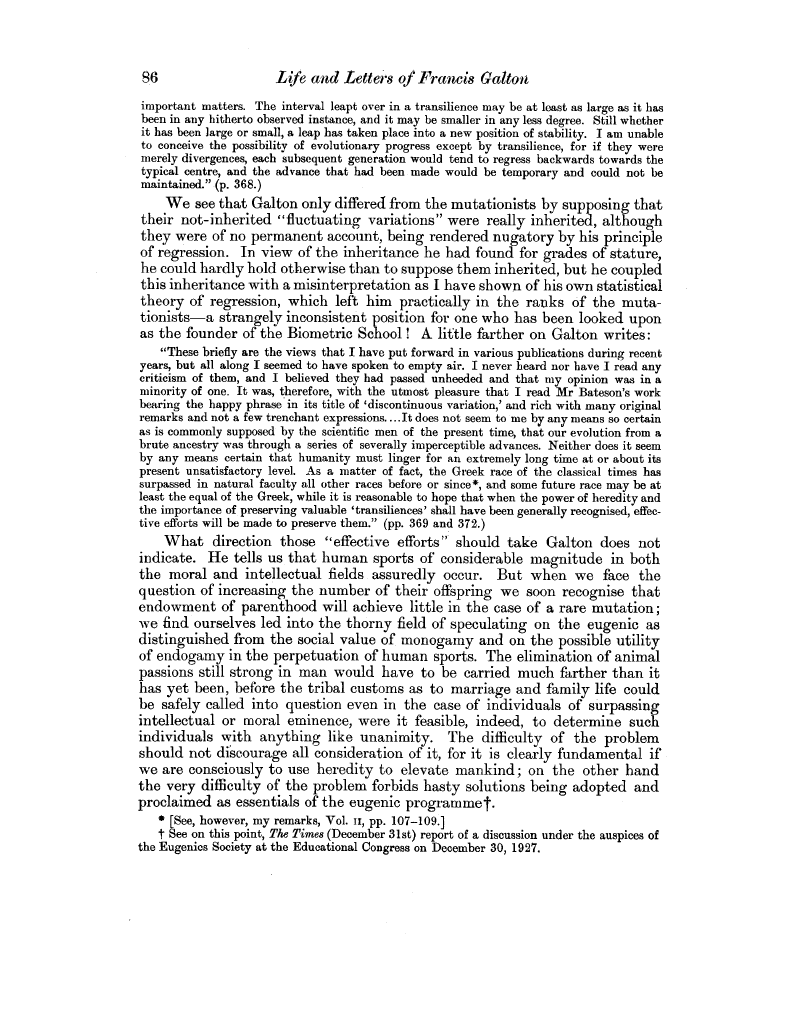| ||||||

OCR Rendition - approximate
86 Life and Letters of Francis Galton important matters. The interval leapt over in a transilience may be at least as large as it has been in any hitherto observed instance, and it may be smaller in any less degree. Still whether it has been large or small, a leap has taken place into a new position of stability. I am unable to conceive the possibility of evolutionary progress except by transilience, for if they were merely divergences, each subsequent generation would tend to regress backwards towards the typical centre, and the advance that had been made would be temporary and could not be maintained." (p. 368.) We see that Galton only differed from the mutationists by supposing that their not-inherited "fluctuating variations" were really inherited, although they were of no permanent account, being rendered nugatory by his principle of regression. In view of the inheritance he had found for grades of stature, he could hardly hold otherwise than to suppose them inherited, but he coupled this inheritance with a misinterpretation as I have shown of his own statistical theory of regression, which left him practically in the ranks of the mutationists-a strangely inconsistent position for one who has been looked upon as the founder of the Biometric School ! A little farther on Galton writes: "These briefly are the views that I have put forward in various publications during recent years, but all along I seemed to have spoken to empty air. I never heard nor have I read any criticism of them, and I believed they had passed unheeded and that my opinion was in a minority of one. It was, therefore, with the utmost pleasure that I read Mr Bateson's work bearing the happy phrase in its title of 'discontinuous variation,' and rich with many original remarks and not a few trenchant expressions.... It does not seem to me by any means so certain as is commonly supposed by the scientific men of the present time, that our evolution from a brute ancestry was through a series of severally imperceptible advances. Neither does it seem by any means certain that humanity must linger for an extremely long time at or about its present unsatisfactory level. As a matter of fact, the Greek race of the classical times has surpassed in natural faculty all other races before or since*, and some future race may be at least the equal of the Greek, while it is reasonable to hope that when the power of heredity and the importance of preserving valuable 'transiliences' shall have been generally recognised, effec tive efforts will be made to preserve them." (pp. 369 and 372.) What direction those "effective efforts" should take Galton does not indicate. He tells us that human sports of considerable magnitude in both the moral and intellectual fields assuredly occur. But when we face the question of increasing the number of their offspring we soon recognise that endowment of parenthood will achieve little in the case of a rare mutation ; we find ourselves led into the thorny field of speculating on the eugenic as distinguished from the social value of monogamy and on the possible utility of endogamy in the perpetuation of human sports. The elimination of animal passions still strong in man would have to be carried much farther than it has yet been, before the tribal customs as to marriage and family life could be safely called into question even in the case of individuals of surpassing intellectual or moral eminence, were it feasible, indeed, to determine such individuals with anything like unanimity. The difficulty of the problem should not discourage all consideration of it, for it is clearly fundamental if we are consciously to use heredity to elevate mankind; on the other hand the very difficulty of the problem forbids hasty solutions being adopted and proclaimed as essentials of the eugenic programme'. * [See, however, my remarks, Vol. ii, pp. 107-109.] t See on this point, The Times (December 31st) report of a discussion under the auspices of the Eugenics Society at the Educational Congress on December 30, 1927.
|